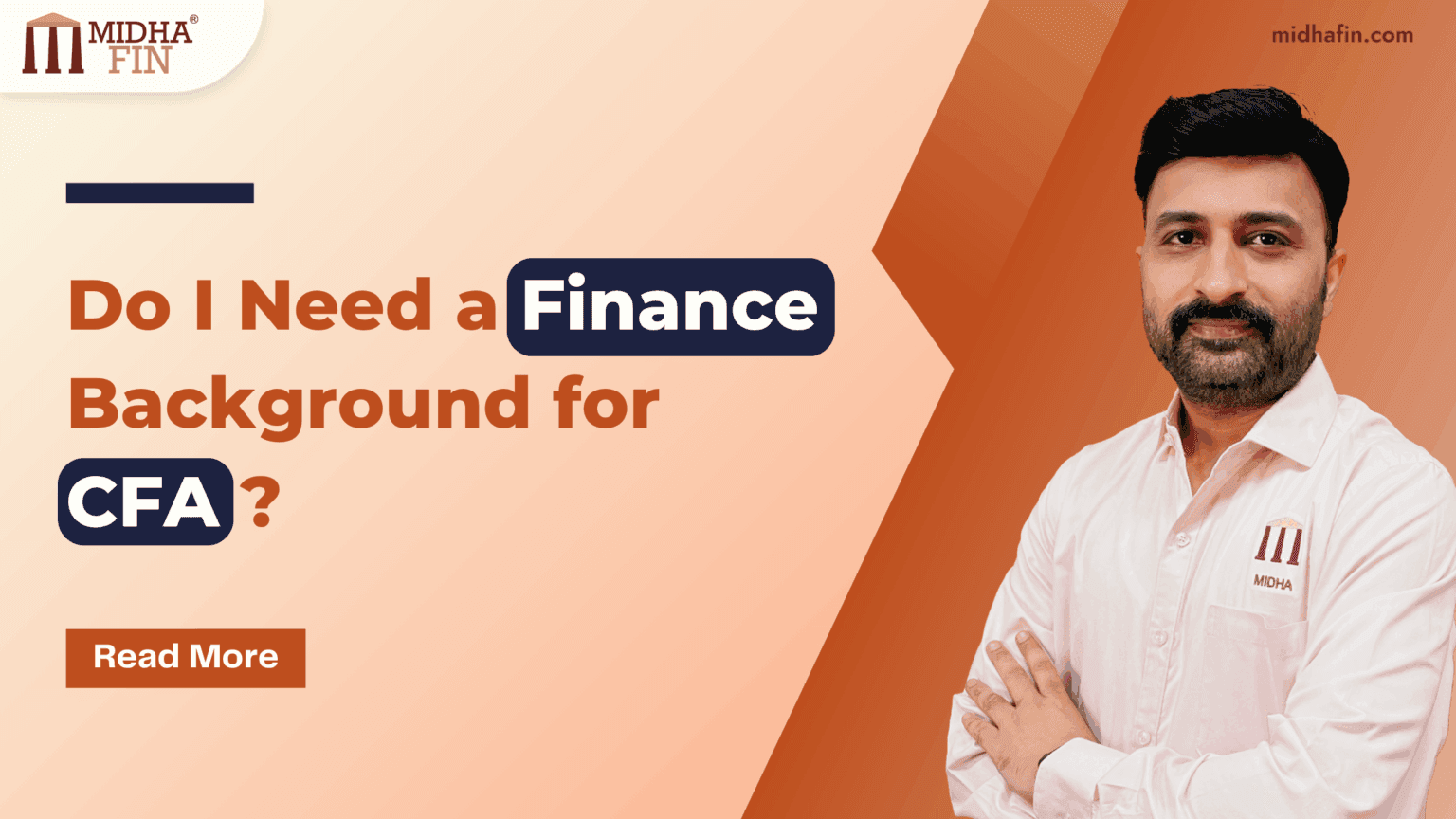Exam PreparationFinance Certifications
Do I Need a Finance Background for pursuing CFA ?

Article content
Introduction
Every year, thousands of candidates from engineering, economics, mathematics, and even the arts begin their CFA journey. Many share the same concern: Can I do this if I don’t have a finance background?
It is a fair question. The CFA curriculum looks intimidating at first glance. Terms like “equity valuation,” “portfolio optimization,” or “derivative pricing” can sound foreign to someone outside finance. Yet the truth is simple. A finance degree helps, but it is not a requirement. What matters most is your ability to learn systematically, think analytically, and stay consistent.
The CFA program is designed for a global audience. It assumes that not every candidate starts with formal finance education. The curriculum builds your knowledge layer by layer, from the basics of money and time value to advanced portfolio management.
Let’s unpack what that really means in practice.
Understanding the CFA Curriculum
The CFA Institute structures the curriculum around three progressive levels. Each level deepens your understanding but begins with clear, defined fundamentals.
Level I – Building the Foundation
Level I introduces you to the language of finance. You learn how markets work, what financial statements show, and how analysts interpret them.
Key subjects include:
- Quantitative Methods: Basic statistics, probability, and time value of money.
- Financial Reporting and Analysis: Understanding income statements, balance sheets, and cash flow.
- Ethics and Professional Standards: The backbone of the CFA program.
- Economics and Corporate Finance: Core principles applied to investment decisions.
A non-finance candidate can learn these with discipline and the right resources. Nothing here requires prior accounting or trading experience. You just need to approach each topic as a structured problem, not as jargon to memorize.
Level II and III – Application and Integration
Level II moves into valuation, asset classes, and analytical techniques. Level III focuses on portfolio management and client strategies.
By the time you reach these levels, you will already have enough context to connect the dots. The progression feels natural if your foundations are clear. This design is intentional — the CFA Institute wants candidates from diverse academic backgrounds to succeed.
The Real Prerequisites: Curiosity and Consistency
What truly predicts success is not a finance degree. It is the willingness to learn consistently over time.
- Curiosity helps you question why a concept matters. When you study risk-adjusted returns, do not stop at the formula. Ask what it means in a real portfolio.
- Consistency keeps you on track. The CFA program rewards steady progress more than bursts of last-minute effort.
Most successful candidates treat CFA preparation like a long-term project. They plan 250–300 study hours per level, review regularly, and practice actively. This discipline levels the field between finance and non-finance backgrounds.
What to Expect If You Are Not from Finance
You will likely face three early challenges.
1. Unfamiliar Terminology
Words like “yield curve,” “accruals,” or “beta” may appear confusing. Do not rush through them. Build a quick glossary as you study. Once you use these terms in examples and practice questions, they will stick naturally.
2. Accounting Concepts
Many candidates find accounting to be the toughest subject initially. Focus on the logic rather than the format. Learn how transactions flow through financial statements. If possible, watch short explainer videos or attend structured sessions that connect accounting to business reality.
3. Quantitative Methods
The math is not advanced, but it requires attention to detail. You will deal with statistics, discounting, and probability. Use spreadsheets to practice calculations and visualise what formulas do. Once you see how the numbers behave, the fear of formulas fades.
How to Bridge the Knowledge Gap
Here are some practical steps to build comfort quickly.
- Start Early with the Basics
Spend the first few weeks understanding financial statements and time value of money. These two topics are used everywhere in the CFA curriculum. - Use the Right Study Order
If you are a beginner, do not start with Derivatives or Fixed Income. Begin with Ethics, Quantitative Methods, and Financial Reporting. That sequence builds a strong foundation. - Focus on Understanding, Not Memorization
Ask “why” behind every formula. For instance, why does compounding matter? Why is discount rate linked to risk? This habit converts facts into intuition. - Join a Study Group or Mentorship Program
Interaction speeds up learning. When you explain a topic to others, you identify your own gaps. MidhaFin’s study groups and doubt-clearing sessions are excellent for this. - Regularly Practice Questions
Conceptual clarity grows through application. After every topic, solve 15-20 questions. Review explanations carefully. The CFA exam rewards reasoning, not memorized answers. - Link Finance to Real-World News
Read market summaries or company reports occasionally. You will begin to connect theory to practice, which is the essence of becoming a finance professional.
How Candidates from Non-Finance Backgrounds Perform
Interestingly, the CFA Institute’s own data shows that many successful candidates come from non-finance backgrounds, particularly engineering and economics.
Why? Because analytical thinking and problem-solving matter more than prior subject exposure. Engineers, mathematicians, and statisticians often find the quantitative parts intuitive. Those from commerce or business degrees may grasp accounting faster. Each background has strengths.
The CFA program equalises the rest. Over time, everyone builds a balanced understanding across ethics, economics, analysis, and portfolio management.
The Value of a Non-Finance Perspective
There is also an advantage to entering CFA without formal finance education. You approach topics with fresh logic instead of assumptions.
For instance:
- An engineer studying portfolio optimization sees it as a systems problem of risk and return.
- An economist views market cycles through data relationships.
- A computer science graduate may see quantitative finance as an extension of algorithms.
These diverse approaches enrich your understanding. Modern finance values multidisciplinary thinking, which includes the ability to apply logic, statistics, and technology together.
What You Gain from the CFA Journey
Regardless of your background, the CFA program builds the same core skill set:
- Ethical and professional reasoning.
- Financial analysis and interpretation.
- Understanding of global investment markets.
- Ability to communicate financial insight clearly.
These are transferable skills. Whether you become a portfolio analyst, risk manager, consultant, or entrepreneur, this foundation adds credibility and structure to your decision-making.
Final Takeaway
You do not need a finance background to pursue the CFA charter. You need persistence, curiosity, and a clear study plan.
Think of the CFA journey as a bridge from where you are to where you want to be. The early steps may feel steep, but every topic builds on the last. Within months, you start thinking like an analyst. The transformation from learning terms to applying logic makes the CFA experience truly rewarding.
Stay patient, stay structured, and stay curious. The finance background can wait. The mindset cannot.
